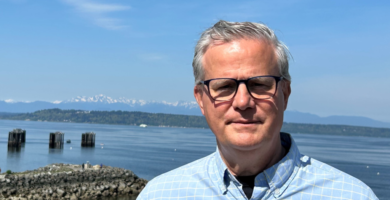Drivers need us.
That’s the point Nick Maxwell makes in an Edmonds (Washington State) News editorial.
Maxwell isn’t some granola-eater who “looks like an environmentalist.” Rather, he is a certified climate action planner for Climate Protection NW. In other words, he has training, experience and expertise that I appeared to have, according to one of my neighbors.
He also seems very observant. In his article, he mentions drivers’ annoyance when they can’t find a parking space while electric vehicle charging stations stand idle in the same parking lot.
He discusses some of the reasons why there aren’t more electric vehicles on the road and points out that it’s not the only reason why drivers can’t park after they’ve made their way through traffic jams.
He notes that in the lot he mentions—and at rail and bus stations—bicycles and eBikes are locked up. But they’re not, contrary to some drivers’ accusations, “taking” “their” parking spaces. Maxwell—and I—have yet to see a bicycle parked in a space designated for a car or truck.
Thus, he says, if more people cycled on to school, work, shop or go to concerts or ballgames, there would be fewer vehicles to jam the roads and fewer drivers competing for parking spaces.
He also says that more cycling, walking or use of mass transit would keep gasoline prices down or, at least, moderate their increases, especially during the summer, when people drive the most.
That last point got me thinking back to an exchange I had with a motorist some years ago. He castigated me—and all cyclists—essentially for inconveniencing him. Then he accused us of “acting like you own the road when we (meaning drivers) pay for it.
I explained that I was paying for that road just as much as he was. Like many other people, he believed that he was paying some sort of tax that I wasn’t. In fact, funds to build and maintain streets, highways and other infrastructure comes from the general pool of taxes everyone pays. The only tax I don’t pay that he pays is on gasoline.
Moreover, non-drivers subsidize drivers in other ways. As an example, if you live or work in a building that offers “free” parking, how do you think the property owners are paying for it. I am sure that the rents or prices they charge are adjusted upward, however slightly, to include what drivers get for “free.”
Oh, and I won’t even get into the fact that we, cyclists, don’t pollute or otherwise spoil the fresh green (or blue or terra cotta or whatever color) outdoor spaces people like to drive to for picnics and the like.
So, I would say that automobile drivers need us—cyclists, walkers and users of mass transportation—even more than Nick Maxwell shows his readers.



